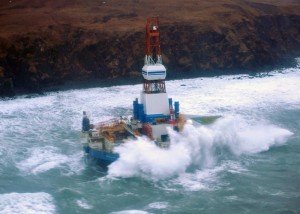
The U.S. Department of Justice disclosed today that they had reached a plea agreement with Noble Drilling LLC for environmental and maritime crimes concerning the Noble Discoverer and the drilling unit Kulluk in a case that was initiated in 2012.
Noble will plead guilty to eight felony offenses in exchange for limiting their liability for their crimes to fines and community service payments of $12.2 million and will be placed on probation for a period of four years. Under the terms of the agreement, Noble must implement a comprehensive Environmental Compliance Plan as well as “implement an Environmental Management System for all Mobile Offshore drilling Units (MODUs) owned or operated by Noble Corporation and its direct and indirect subsidiaries worldwide,” Alaska District U.S. Attorney Loeffler stated.
According to the press release issued on Monday:
“Noble Drilling (U.S.) LLC was charged in an eight-count Information with knowingly failing to maintain an accurate Oil Record Book and an accurate International Oil Pollution Prevention certificate, knowingly failing to maintain a ballast water record book, and knowingly and willfully failing to notify the U.S. Coast Guard of hazardous conditions aboard the drill ship Noble Discoverer. At the time of the offenses, the Noble Discoverer was operating under contract with Shell Offshore, Inc. and Shell Development, Ltd. for the purpose of drilling in the arctic in Alaska.”
Court documents revealed that Noble was the operator and bare boat charterer of the Noble Discoverer and the drilling operator of the un-powered Kulluk during Shell’s 2012 drilling season in the state of Alaska. After the conclusion of that mishap-riddled drill season, the Kulluk ran aground on Sitkilidak Island in the Kodiak Archipelago while being towed south, and the Noble Discoverer had to be towed to Seward from Dutch Harbor because of main engine and equipment failure.
Noble admitted in court, as required under the plea agreement, that they had “knowingly made false entries and failed to record its collection, transfer, storage, and disposal of oil in the Noble Discoverer’s and the Kulluk’s Oil Record Books in 2012,” according to the U.S. Department of Justice press release.
Noble admitted that they had failed to use the Discoverer’s Oil Water Separator at times, yet logged entries falsely claiming that it was utilized even though that equipment was inoperable.That equipment is meant to separate oil and water from discharge so that no more than 15 ppm is discharged into the ocean under the International MARPOL protocol and the Act to Prevent Pollution from Ships.
According to prosecutors, Noble made modifications to the ship’s OWS system after it was inspected by the Classifications Society and the U.S. Coast Guard and did not receive certification for the unapproved decanting system or the new piping arrangement.
During their time in Alaskan waters in 2012, Noble devised a makeshift barrel and pump system to discharge oil and water from the ship’s engine room directly overboard without passing through the OWS system. While using this makeshift system, Noble hid the fact that it was in use, failing to notify the Coast Guard and falsifying records in direct violation of APPS. In one such instance, Noble discharged bilge water into the Broad Bay waters, creating a visible sheen across the bay in July of 2012.
Noble failed to log transfers into and out of their water ballast tanks under the requirements of the Nonindigenous Aquatic Nuisance Prevention and Control Act as well. Noble pumped oily skimmer tank fluids as well as other contaminated water into the water ballast tanks that were to contain only uncontaminated water. Then in direct violation, Noble then pumped that contaminated water directly into the sea without routing it through the OWS system or pumping it off-ship to a shore-side facility.
According to the agreement reached in court, Noble also didn’t advise the Coast Guard of hazardous conditions aboard the vessel because of multiple engine room oil and fuel leaks and unsafe conditions because of exhaust at the time of their main engine and propulsion shaft malfunction and failure. Noble admitted to this in court.
The Noble Discoverer was initially detained by the Seward Officer in Charge of Marine Inspections after an examination by the Coast Guard Port State Control in November of 2012.
